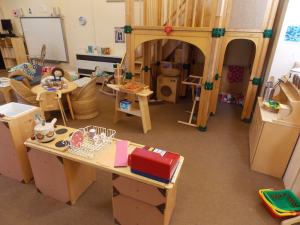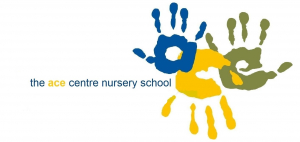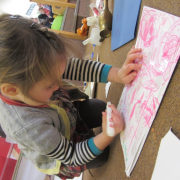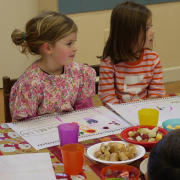Our Learning Environment
An inspirational space
“Promoting children’s expressive, creative and imaginative skills is a real strength. Staff are united in their belief that it is the process of being creative, rather than simply the final product, that is key to success. Children relish the opportunity to develop their own ideas through selecting and using different artistic materials and techniques. Children display competency when using a host of different materials and tools, such as using the glue gun competently.” (Ofsted 2018)
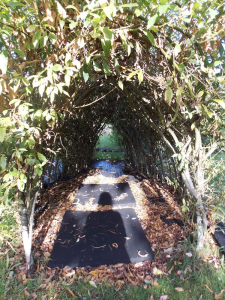
“Constant reflection and relevant discussion among the whole team, focused on each child’s developing needs, lead to exceptionally creative and well-planned activities that seamlessly incorporate all six areas of the Early Years Foundation Stage curriculum. Consequently, they make outstanding progress. Children have access to a wonderland of interesting and stimulating activities both indoors and outside, in the delightful garden, which is very skilfully used to set up rich opportunities for learning. In addition, the school runs a ‘forest school’, where children experience the freedom and enjoyment of playing and learning in a completely natural setting in nearby woods.”(Ofsted 2009).
Indoors and outdoors
“Many opportunities exist for children to assess and manage risks while engaged in adventurous activities, particularly during the weekly Forest School visits. In the nursery garden, boys building an imaginary fire and river decided to make large posters telling people to ‘beware of the fire and the lake’.” (Ofsted 2014)
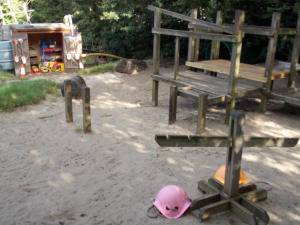 “Children enjoy daily uninterrupted time to play and explore a wide range of stimulating and challenging activities. Exciting opportunities for learning and developing exist in the extremely generous outdoor area. Children strengthen their muscles and develop their control and balance as they climb and dig and run around obstacles. They develop a sense of awe and wonder for the natural world as they pick fruit and dig the potatoes they have planted. One really special moment occurred when they found some tiny eggs in the ground and identified them with the help of the internet.
“Children enjoy daily uninterrupted time to play and explore a wide range of stimulating and challenging activities. Exciting opportunities for learning and developing exist in the extremely generous outdoor area. Children strengthen their muscles and develop their control and balance as they climb and dig and run around obstacles. They develop a sense of awe and wonder for the natural world as they pick fruit and dig the potatoes they have planted. One really special moment occurred when they found some tiny eggs in the ground and identified them with the help of the internet.
They are quick to ‘have a go’ as they develop their critical thinking and creativity, digging to make a river and building dens with willow. These activities are continuously built upon during children’s regular Forest School experiences.” (Ofsted 2014)
“Children marvel at nature by observing veins on leaves, they are fascinated by space and creatively explore the world of fairies, princesses and pirates in the ‘small world’ area. Excellent learning is characterised by children’s inquisitiveness, having hands-on experiences using a variety of media and acquiring language at a very fast rate. This prepares them very well for the next stages of their education.” (Ofsted 2011)
Exploration, real experiences, hands-on learning open-ended
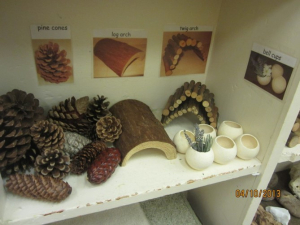
“Exciting, challenging and imaginative activities and stimulating resources thoroughly engage children.
Adult expertise in talking to children about their learning and joining in their play is very strong. This supports children’s thinking skills and language development especially well.” (Ofsted 2014)
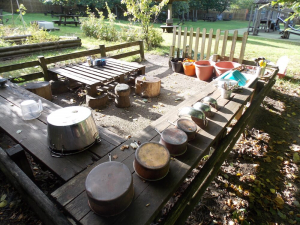
Choices, independence
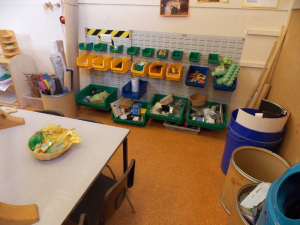
“Children’s independent skills are promoted extremely effectively. Both indoors and outdoors, activities are well organised and appealing. As a result, children are adept at making choices, such as during creative play, knowing exactly where to go and what to get. Staff are magnificent at hooking in to each child’s interests, planning in the moment and taking a steer from children’s experiences. Parents, too, are appreciative of the school’s methodology, with one commenting, ‘The nursery school is child-centred, and children are not forced into learning arbitrary things. Instead, the adults see what a child is interested in first, then run with that.” (Ofsted 2018)
“Children confidently choose their own activities and become self-assured and independent. They move purposefully between the different areas and activities because resources are attractive and well prepared and kindle their interest and curiosity.” (Ofsted 2014)
Cooperation and social skills
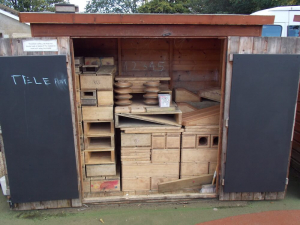 “Children play exceptionally happily together and because they are listened to by adults they learn to listen to one another. In their play there are lots of opportunities for them to learn to take turns, share and help one another. A fine example of this was when two boys pulled the very heavy water carrier up the hill together to fill up the stream they were making. Because children get on so well together they are eager to attend the nursery and play with their friends.
“Children play exceptionally happily together and because they are listened to by adults they learn to listen to one another. In their play there are lots of opportunities for them to learn to take turns, share and help one another. A fine example of this was when two boys pulled the very heavy water carrier up the hill together to fill up the stream they were making. Because children get on so well together they are eager to attend the nursery and play with their friends.
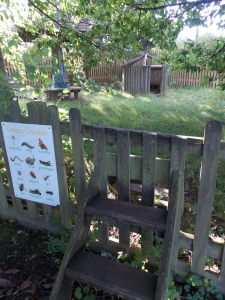 The outdoor area is a haven of activity with children climbing, building, gardening and cooperating with one another. Children demonstrate outstanding social skills in the way they learn and share equipment with one another. Skills of independence, perseverance and resilience in learning are
The outdoor area is a haven of activity with children climbing, building, gardening and cooperating with one another. Children demonstrate outstanding social skills in the way they learn and share equipment with one another. Skills of independence, perseverance and resilience in learning are
consistently encouraged by staff.” (Ofsted 2011)
Risk and challenge
“Children play safely both indoors and outdoors and it is the norm in this nursery to see children looking out for one another’s safety outdoors. ‘Be careful, don’t stand too close to the slide,’ are comments heard daily in the excellent outdoor provision.” (Ofsted 2011)
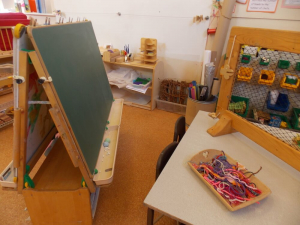 “Children are inspired and challenged to explore, experiment and cooperate with each other, which results in much discussion and problem solving, for example how to use a new recording device to take messages between two adults or how to tackle a very challenging climbing frame and reach the other side without falling off. The skilled intervention by adults, who know that effective learning happens through active involvement in a range of tasks and activities, leads to increased confidence, perseverance when things don’t quite work out and obvious enjoyment when they do succeed.” (Ofsted 2009)
“Children are inspired and challenged to explore, experiment and cooperate with each other, which results in much discussion and problem solving, for example how to use a new recording device to take messages between two adults or how to tackle a very challenging climbing frame and reach the other side without falling off. The skilled intervention by adults, who know that effective learning happens through active involvement in a range of tasks and activities, leads to increased confidence, perseverance when things don’t quite work out and obvious enjoyment when they do succeed.” (Ofsted 2009)
